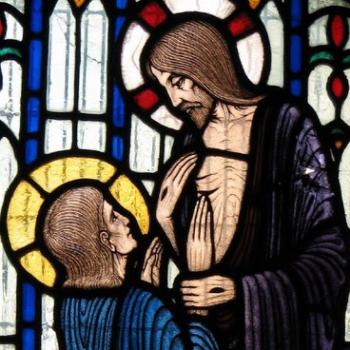In our “Faith and Doubt” colloquium last spring, my Dominican priest colleague and I filled the syllabus with authors who have shaped our own perspectives on and continuing lives of faith. Many such authors on my list have made regular appearances in this blog over the past decade; Anne Lamott, Michel de Montaigne, Simone Weil, Dietrich Bonhoeffer, Iris Murdoch, and Rachel Held Evans all made important appearances during the semester.
My colleague’s influences included several who also are on my list, including Søren Kierkegaard, Friedrich Nietzsche, and Fyodor Dostoevsky, all of whom have been fellow companions on my faith journey for years. The author on my colleague’s list who captured my imagination most, however, was someone whose work I was completely unfamiliar with until we taught this course for the first time a year ago: Czech Catholic priest, philosopher, theologian, and psychologist Tomáš Halík. His Night of the Confessor was the last text we considered; Halík made his first appearance ever on this blog back in May.
Halík’s theological insights are striking, but I must admit that one of the first things that attracts me to his work is his curmudgeonliness (spell check says that isn’t a word, but it should be), a feature that matches up to the same quality in me on certain matters. For instance, Halík apparently hates academic/professional conferences as much as I do. He describes one clergy conference he was forced to attend as follows:
I have the feeling . . . that I have been catapulted into Sartre’s play No Exit, where, after a while, the audience realizes that all the protagonists are dead but behave as if nothing has happened. One Czech priest compared the Church to a mill that still clattered away but no longer ground anything.
Tell me about it, Tomáš. One of the many blessings of being a full professor is that I no longer need to pad my resumé with attending such gatherings for which Dante should have assigned a special circle in hell.
Halík also shares my constitutional aversion to what he calls “clappy-happy religion.” “Discreet Faith,” my favorite chapter in Night of the Confessor, is shaped by Halík’s refusal to accept the invitation of a couple of enthusiastic young people to attend a Christian mega-rally that they are very excited about. “No, I’m sorry, I really won’t come,” Halík replies. Why?
I myself came to faith slowly through a process of doubt; I find it hard to imagine being suddenly infected by collective piety at some mass rally with banners reading JESUS LOVES YOU and cheerleaders with unbearably fixed smiles. . . Naturally I respect the fact that there are those who feel the need to be crushed in a crowd of like-minded people to strengthen their faith. My faith would more likely be lost in a throng like that.
Halík knows, as I do, that at least some of his resistance to such worship and expressions of faith is simply a reflection of his basic personality.
His real issue, though, is with “the brazenly casual way that people there trumpet out the great words of our faith.” Halík quotes theologian Nicholas Lash favorably, who writes that “it is the tragedy of modern Western culture to have fallen victim to the illusion (widely shared by believer and nonbeliever alike) that it is perfectly easy to talk about God.” Such overfamiliarity with the transcendent leads to any number of “idols,” models of the divine that have been crafted out of human projections with little respect for the mystery and “otherness” of God.
Halík advises that “when someone is introduced into the faith they need to be told clearly that they are being introduced into a world of mystery and depth.” It is occasionally helpful in the life of faith to list the various models of God that have over time proven to be insufficient, something I did not long ago in this blog.
Halík provides us with his personal list of Gods that he does not believe in:
- The enlightenment’s god of reason, its “Supreme Being”
- The deist’s “Great Watchmaker”
- The ancient Greeks’ immutable Fate or the Muslims’ kismet
- The Gaia goddess or Mother Nature and her objective laws
- The law of karma and the cycle of birth and rebirth
- A private god, who would be an utterly private light of my conscience and my heart.
- A romantic god that would offer itself solely as a “religious sense” or “the starry heavens above me and the moral law within me.”
That rules out a lot of popular possibilities, but as any undergraduate learns in an introductory logic class, it is not possible to define something negatively. You can’t positively define something but listing everything that it isn’t. In the early years of our relationship, Jeanne frequently would complain that God frequently fails to live up to the common definition of all-powerful, all-good, and all-knowing. My response always was that “whatever God is, apparently God isn’t that.”
When seeking to say something intelligible about God, this is called “apophatic theology,” which seeks to define or know God through negative statements. The above lesson from introductory logic indicates that such a strategy will never lead to a positive definition. That doesn’t mean that no progress knowledge of what is greater than us cannot be made apophatically. As Tomáš Halík insists, we must always remember that the world of faith is a world of “mystery and depth,” not a world of certainty. As Michel de Montaigne wrote, it is the height of foolishness and hubris to suppose that we can know anything with certainty about what is far beyond our capacities of understanding.
To condemn a thing, dogmatically, as false and impossible, is to assume the advantage of knowing the bounds and limits of God’s will and of the power of our mother Nature; there is no more notable folly in the world than to reduce these things to the measure of our capacity and competence.
As Anne Lamott once said, “the best definition of God is ‘not me.’”
















